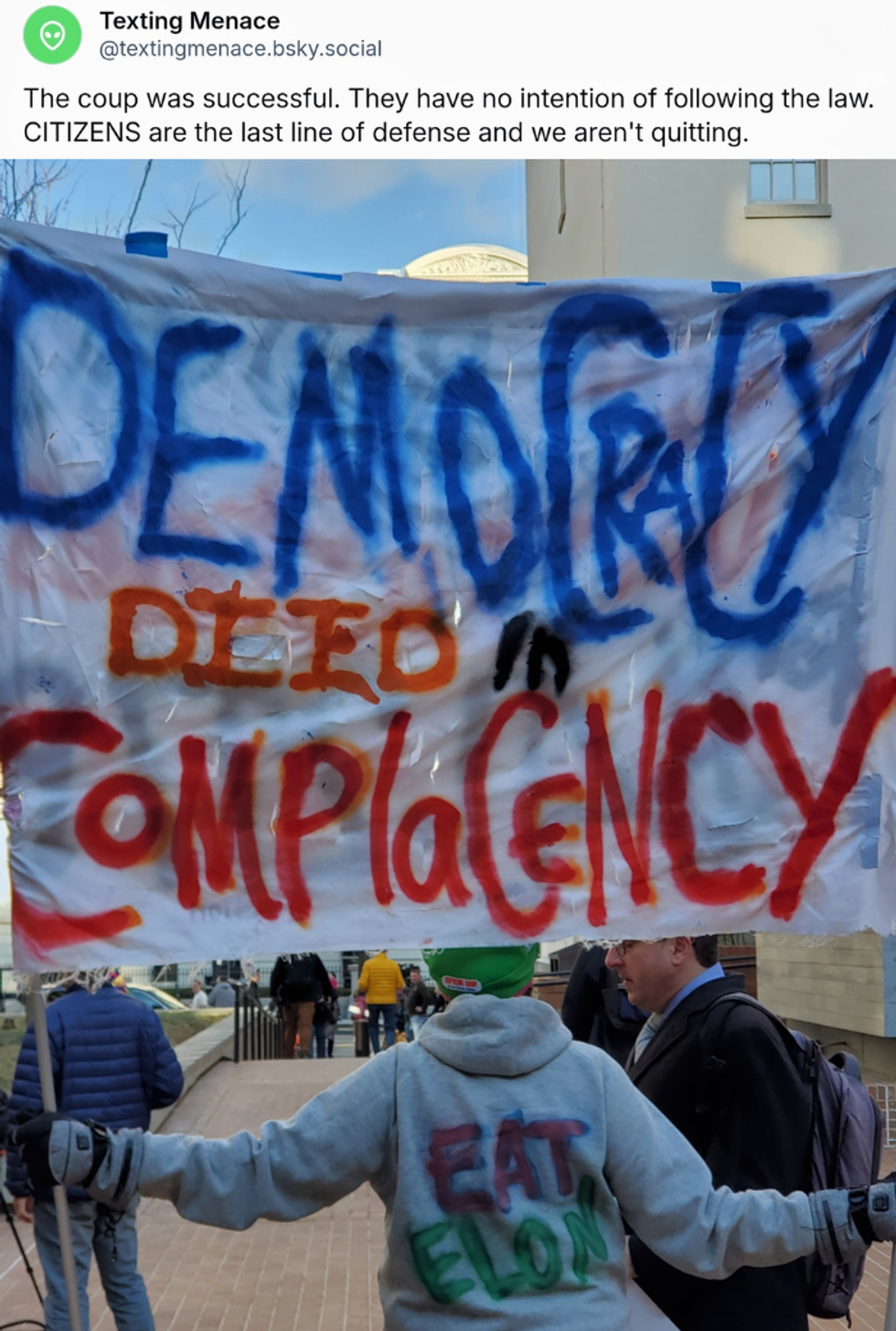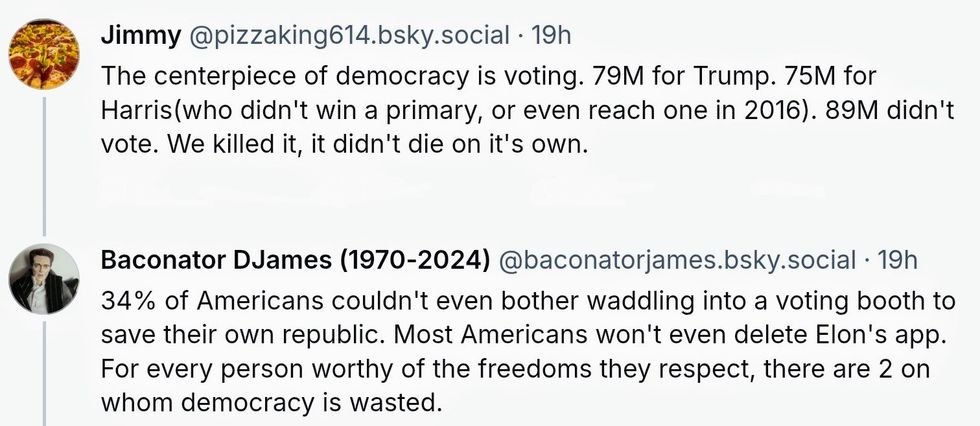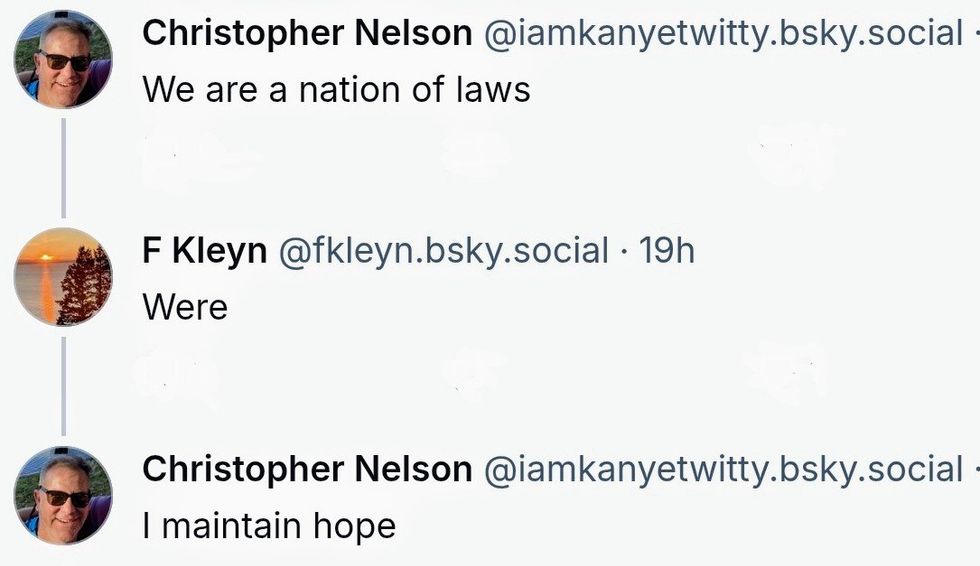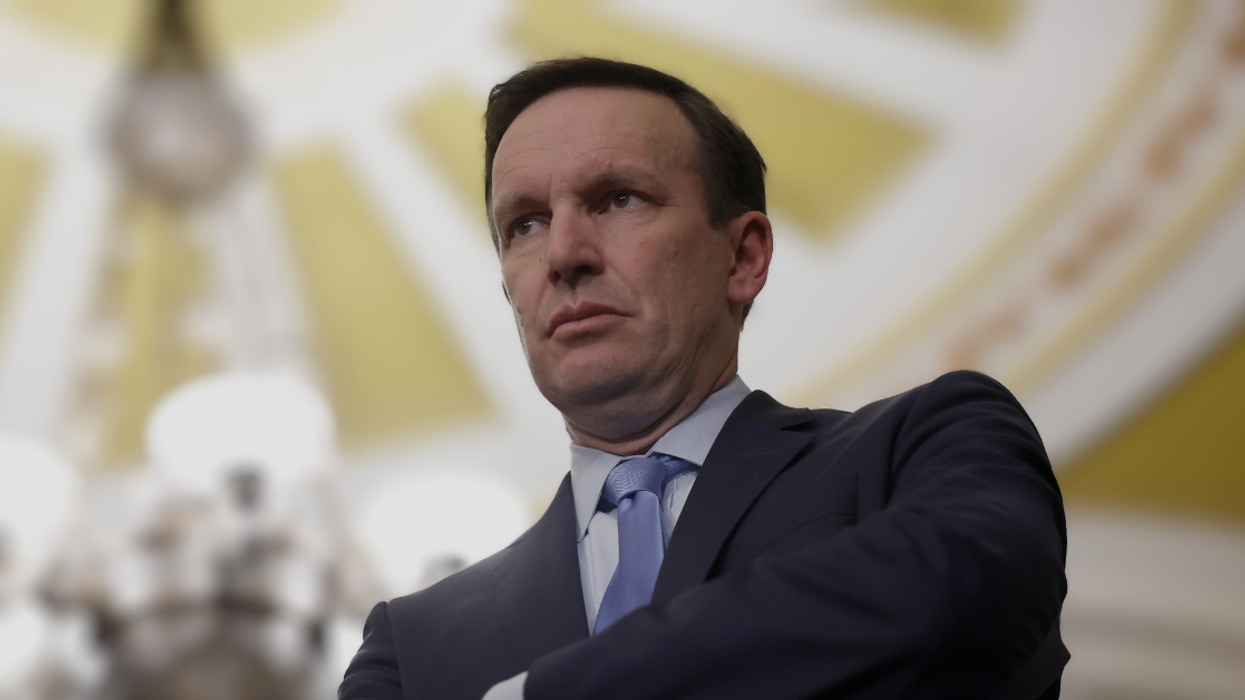While a civics refresher should be unnecessary for anyone serving in the federal government, members of the Trump administration and their allies seem to be sorely lacking in basic knowledge about the powers and limits of each of the three branches: the Executive, the Legislative, and the Judicial.
The sitting Vice President, cabinet members and nominees, and Republican politicians all seem to think the Executive branch—namely, the administration of Republican President Donald Trump—is exempt from any of the constitutionally mandated checks and balances and is limitless in its power.
Connecticut Democratic Senator Chris Murphy is sounding the alarm on what this means for the United States.
You can watch the moment here:
Murphy: "This isn't hyperbole to say we are staying the death of democracy in the eyes right now. The centerpiece of our democracy is we observe court rulings."
[image or embed]
— Aaron Rupar (@atrupar.com) February 10, 2025 at 9:09 PM
In a Monday night appearance on CNN's The Source with Kaitlan Collins, Collins asked Murphy:
"Senator Murphy, as we look at the developments that have happened, in the last 48 hours, what are your concerns about this moment that we’re at with the courts, with the President, and with this suggestion from two of his top advisers that maybe they defy the court’s rulings?"
Murphy responded:
"Yes, listen, I mean, this isn’t hyperbole to say that we are staring the death of democracy in the eyes, right now."
The Connecticut Democrat continued:
"The centerpiece of our democracy is that we observe court rulings. Criminal court rulings, civil court rulings and constitutional court rulings. No one is above the law. And whether we like it or not, the courts interpret the law."
"So yes, throughout the history of the United States, the courts have made rulings on when the executive branch is exercising legal power, and when they are going beyond the power that they have, either constrained by statute, or by the Constitution, just as they regularly rule on whether or not individuals have complied with the law or violated the law, whether those be civil laws or criminal laws."
Murphy added:
"If the President of the United States says, 'You know what, I don’t care what the courts say, I’m going to do whatever the hell I want'? That’s essentially the end of the rule of law."
"Because if the President isn’t bound by our laws and the Constitution, then why would anybody else be bound by our laws and the Constitution? This is a really dire moment."
"And no, so far, they’ve been talking tough, but I think largely have complied with these court orders. I think there’s going to be a question as to how well they have complied with the orders."
"But if they were to outright ignore an order, as JD Vance and Elon Musk are suggesting, that is maybe the greatest challenge to our democracy in any of our lifetimes."
Kaitlan Collins then asked:
"But you’re saying we’re not there yet, basically?"
Senator Murphy replied:
"Well, listen, on this specific question of whether or not they are prepared to openly violate a court order? We are not there. They are not complying with the existing court orders, but they are in partial compliance."
"But if they were to openly declare that because they disagree with, for instance, a court’s order to reopen USAID, or to get Elon Musk out of the Treasury Department, simply because on the merits, they disagree with the court’s ruling, then you are clearly in the most serious constitutional crisis, I mean, arguably, of the last 100 years."
Collins then asked for clarification.
"And so what happens? I just want to game this out. If that happens, and you’re saying that you don’t think it has yet, then what’s next, if that—if they do defy a court order."
"And it’s not just a tweet or a Truth Social post. It’s them telling a judge, We think you’re wrong, we’re not going to comply with this. Then what happens?"
Senator Murphy explained:
"Well, I mean, listen, I am not an active-practice lawyer. But the first thing you do would be to go back to the court, and hold the administration or the individuals, who are not complying, in contempt."
"And there are a series of remedies that the court can order if someone is in contempt, including jailing them. So, there is a series of escalatory steps that–"
CNN's Collins interjected:
"But who would be responsible for enforcing that?"
Senator Murphy replied:
"Well, I mean, ultimately, that’s law enforcement. So, there’s where you get in trouble."
"This is why somebody like JD Vance has suggested that there may be no remedy, ultimately, for a violation of a court order, because it would be law enforcement in control of the Executive branch that may ultimately have to enforce the order."
"So, therein lies the crisis that ultimately becomes a civil and political crisis for the country. Listen, let’s hope we don’t get there. Let’s hope that this is bluster."
Despite Senator Murphy's hope for just bluster, federal civil servants—who take an oath of office to uphold the Constitution upon employment—are finding themselves stuck between the Trump administration's overreach and the court orders curbing it.
On Tuesday, a leaked FEMA email sent on Monday revealed at least one agency head instructed subordinates to withhold funds appropriated and authorized by Congress. But earlier on Monday, U.S. District Judge John J. McConnell ordered the funding freezes to stop.
And at least four FEMA aides were fired for being "deep state activists" according to the spokesperson for Homeland Security Secretary Kristi Noem, whose agency oversees FEMA.
Noem herself told CNN host Dana Bash that Americans "can't trust the government anymore" on Sunday.
People found Murphy's warning appropriate and on target.

No doubt about it. We are there right now. Fascism is directly upon us.
— Dave (@novre52.bsky.social) February 10, 2025 at 9:11 PM





Anyone with a passing knowledge of the structure of the United States federal government, as prescribed by the Constitution, should know there are three branches of government: the Executive, the Legislative, and the Judicial.
Based on the Haudenosaunee Confederacy's Great Law of Peace, these divisions—again, set forth in the Constitution—assign specific duties, responsibilities, and limits to the powers of each branch.
The Executive branch handles the day-to-day logistics of the federal government through the President and their administration, the Legislative branch passes laws and bears sole responsibility for the appropriation of funds and their distribution, and the Judicial branch—in addition to other legal duties—determines if the actions of either the Executive or Legislative branch violates federal laws or the Constitution.
The United States version of a confederated democracy—where individual states with independent governments combine to form one nation—is designed to maintain checks and balances. No one branch controls everything.
After all, the framers of the Constitution had just rebelled against an autocratic, theocratic monarchy where a king or queen ruled all by divine right and an official religion—King Henry VIII's Church of England—existed.
The last thing they wanted was a government that was a pathway to fascism or to the rise of a dictator. So they turned to the oldest continuous democracy—the Haudenosaunee Confederacy which combined tribes with their own independent governments into one confederated democracy—for inspiration.
Perhaps it's time to consider requiring anyone holding an elected or appointed position in the federal government to pass a test on the basics of the United States government.
If it's a good idea as a requirement for immigrants on their path to become naturalized citizens, why not the President and his administration, too?








 @lamorne/Instagram
@lamorne/Instagram @bigbeaubrown/Instagram
@bigbeaubrown/Instagram @musiccitykristy/Instagram
@musiccitykristy/Instagram @phil_torres/Instagram
@phil_torres/Instagram @vbarreiro/Instagram
@vbarreiro/Instagram @franklinjleonard/Instagram
@franklinjleonard/Instagram @br1an02/Instagram
@br1an02/Instagram @ohhelloitsmax/Instagram
@ohhelloitsmax/Instagram @frecklesmarie/Instagram
@frecklesmarie/Instagram








 @JaJa_no_NO/X
@JaJa_no_NO/X @CWMorgan1000/X
@CWMorgan1000/X reply to @spain2323/Instagram
reply to @spain2323/Instagram reply to @spain2323/Instagram
reply to @spain2323/Instagram reply to @spain2323/Instagram
reply to @spain2323/Instagram reply to @spain2323/Instagram
reply to @spain2323/Instagram reply to @spain2323/Instagram
reply to @spain2323/Instagram reply to @spain2323/Instagram
reply to @spain2323/Instagram reply to @spain2323/Instagram
reply to @spain2323/Instagram reply to @spain2323/Instagram
reply to @spain2323/Instagram reply to @spain2323/Instagram
reply to @spain2323/Instagram reply to @spain2323/Instagram
reply to @spain2323/Instagram reply to @spain2323/Instagram
reply to @spain2323/Instagram reply to @spain2323/Instagram
reply to @spain2323/Instagram reply to @spain2323/Instagram
reply to @spain2323/Instagram reply to @spain2323/Instagram
reply to @spain2323/Instagram reply to @spain2323/Instagram
reply to @spain2323/Instagram reply to @spain2323/Instagram
reply to @spain2323/Instagram